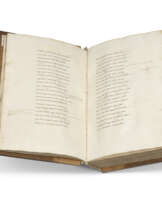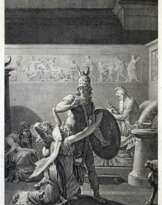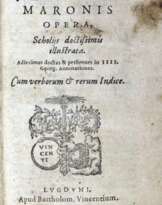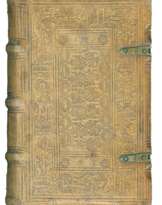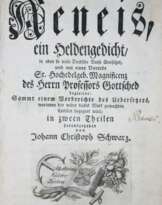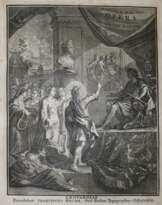ID 993250
Los 31 | Virgil (70-19 BCE)
Schätzwert
£ 6 000 – 9 000
Fragments from a bifolium of the Aeneid, Books II and III, in Latin, manuscript on vellum [France, 10th century]
Substantial Carolingian fragments of the Aeneid, one of the greatest works of Western Classical literature, with contemporary marginal and interlinear glosses.
c.10-15 x 400-410mm., 11 horizontal strips of a bifolium with c.20 visible lines of largely continuous text (see Content below) written in a fine, rounded Carolingian minuscule, interlinear and marginal glosses written in a lighter ink in a contemporary hand, one 5-line decorated initial 'P' opening Book III (recovered from a binding, where used as sewing guards, and consequently fragmentary and with a pronounced crease down the middle of each strip, the lighter ink of the glosses somewhat faded, a few tears and smudges, but the text generally legible and in good condition).
Provenance:
The fragments were extracted from a 15th-century binding of a c.1477 Nuremberg incunable, where they were used as sewing guards.
Content: The text covers the end of Book II of the Aeneid and the beginning of Book III, where Aeneas is recounting to Dido the tale of the fall of Troy and his rallying of the Trojan survivors and building of a fleet, their escape from the Harpies, and the games at Actium. The strips can be re-assembled into larger fragments of partially continuous text from Aeneid Books II and III as follows: (recto) Book II.763: 'predam adservabant. huc undiq[ue] Troia gaza'; 765: 'crateresq[ue] auro solidi captivaq[ue] vestis'; 771-774: 'querenti et tectis urbis sine fine [ruenti]' to 'obstipui steteruntq[ue]; comae: et vox faucib[us] hessit'; 777-784: 'o dulcis coniunx? non hec sine numine divu[m]' to '[parta] tibi; lacrimas dilecte pelle Cr[eusae]'; 788-791: 'sed me magna deu[m] genetrix his detinet oris' to '[dicere deseruit tenui]sque recessit in auras'; (verso) 792-795: 'ter conatus ibi collo dare brachia circum' to 'sic demum socios consu[m]pta nocte reviso'; 800-804: '[in quascumque velim] pelago deducere terras' to 'limina portaru[m], nec spes opis ulla dabatur'; Book III.1-7: 'Incipit Lib[er] III. / Postqua[m] res Asiae P[ri]amiq[ue] evertere gente[m]' to '[incerti quo fata ferant] ubi sistere detur'; 11-14: 'et campos ubi Troia fuit: feror exul in altu[m]' to 'Thraces acri quondam regnata [Lycurgo]'; 248: 'Laomedontiade bellu[m] inferre paratis'; 250: 'accipite ergo animis atq[ue] h[aec] mea figite dicta'; 256-258: 'qua[m] vos dira fames nostreq[ue] iniuria caedis' to 'dix[it] et in silva[m] pennis ablata refugit'; 260-267: '[deriguit:] cecidere animi nec ia[m] a[m]p[lius armis]' to 'diripere excussosq[ue] iubet laxare rudentis'; 271-274: '[Dulichiumque] Sameq[ue] et Neritos ardua saxis' to 'mox et Leucate [nimbosa cacumina montis]'; (recto) 277: '[ancor]a de pr[or]a iacitur: stant litore pupes'; 279: 'lustramurq[ue] Iovi votisq[ue] incendim[us] aras'; 285-287: 'et glacialis hiems Aquilonibus asperat undas' to '[postibus adversis] figo et rem carmine signo'; 289-296: 'linquere [tum portus iub]eo et considere tra[nstris]' to '[coniugio Aeacidae] Pyrrhi sceptrisq[ue] potitu[m]'; and 300-303 'progredior portu: classes et litora linquens' to '[libabat cineri Andromache mani]sq[ue] vocabat'.
A cornerstone of literature from its first publication after Virgil's death to the present day, the Aeneid survives in over 1,000 medieval and Renaissance manuscripts. Even though it enjoyed particular attention in the Carolingian period (Virgil's portrayal of empire-building resonated with political and military events of the time), early witnesses of the text such as these remain extremely rare on the market. The most renowned and influential commentary of the Aeneid is that of Servius, the 4th-century grammarian, which incorporated much of the work of his predecessor Aelius Donatus (whose own work does not survive). Other early commentators were Tiberius Claudius Donatus (whose commentary survives in Florence, Biblioteca Medicea Laurenziana, MS Plut.45.15; Rome, Biblioteca Apostolica Vaticana, MS Reg. lat. 1484; and MS Vat. lat. 1512); Priscian, whose analysis of the Aeneid was almost exclusively grammatical; and Fulgentius, who was the first to give a global allegorisation of the text. Our surviving fragments contain interlinear and marginal glosses which indicate close educational engagement with the text, but are not particularly indebted to any of the principal commentators. On the commentary tradition of Virgil, see J. Ziolowski, The Virgilian Tradition, 2008, pp.623-824; on Carolingian glosses see M. McCormick, Five Hundred Unknown Glosses from the Palatine Virgil: The Vatican Library, MS. Pal. Lat. 1631, 1992.
Special notice
This lot has been imported from outside of the UK for sale and placed under the Temporary Admission regime. Import VAT is payable at 5% on the hammer price. VAT at 20% will be added to the buyer’s premium but will not be shown separately on our invoice.
| Künstler: | Vergil (70 v. Chr. - 19 v. Chr.) |
|---|---|
| Herkunftsort: | Italien, Europa |
| Kategorie des Auktionshauses: | Handschriften des Mittelalters und der Renaissance |
| Künstler: | Vergil (70 v. Chr. - 19 v. Chr.) |
|---|---|
| Herkunftsort: | Italien, Europa |
| Kategorie des Auktionshauses: | Handschriften des Mittelalters und der Renaissance |
| Adresse der Versteigerung |
CHRISTIE'S 8 King Street, St. James's SW1Y 6QT London Vereinigtes Königreich | |
|---|---|---|
| Vorschau |
| |
| Telefon | +44 (0)20 7839 9060 | |
| Aufgeld | see on Website | |
| Nutzungsbedingungen | Nutzungsbedingungen |



